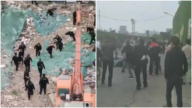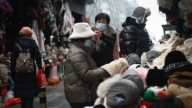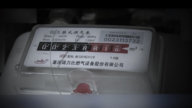【新唐人2013年12月26日訊】年終盡頭,中國人民銀行24號採取290億元人民幣逆回購操作,期限七天;同一天,上海銀行同業拆息再度抽升,其中7天期及14天期拆息升到超過8厘水平,創年內次高。中共當局在資金壓力下,向傳媒發出警告,禁止報導「錢荒」。專家分析,「錢荒」導致的金融危機將觸發中共政權的崩潰。
從12月17號開始,中國銀行業市場利率一路全線跳躍飆升;20號,儘管央行連續三天向市場注資3000多億元人民幣,但各大銀行對央行公開市場操作的期望繼續落空,市場利率接近6月份「錢荒」水平,市場恐慌加劇。
24號,上海銀行同業拆息再度抽升,其中7天期及14天期拆息大漲100多點,超過8厘的水平,創年內次高。
東方證券銀行業分析師金麟表示,年底銀行間流動性壓力遠超過預期,再加上元旦、農曆新年的到來,流動性壓力也大增。
據英國《金融時報》引述消息說,中共宣傳部門已發出警告,不要炒作銀行間市場流動性問題,在某些情況下,還禁止使用「錢荒」二字。
美國南卡羅萊納大學艾肯商學院教授謝田表示,中國的錢荒從今年6月份開始,不但沒緩解,還越演越烈。實際上,很多資金都流到國有企業和中共權貴手中。
美國南卡羅萊納大學艾肯商學院教授謝田:「中共它每次在刻意的避免某些敏感詞彙的時候,都是因為這些詞彙揭示了中國以及最深層、最深刻的問題。它(中共)害怕揭示到最關鍵的問題,這是一個它看來解決不了的問題、中國經濟金融的一個死結。」
大陸媒體報導,進入6月以來,中國各地大中城市樓價繼續攀升,據中共國家統計局日前公布的數據顯示,8月全國70大中城市樓價按年上升8.3%。一線城市,如北京、上海、廣州和深圳等四大城市的樓價,按年上漲近20%。同時地王頻現,進一步推高樓價。
大陸金融分析師任中道:「錢從哪裏來?那些房地產商弄到土地證之後,就去銀行貸款,這就歸到一個更深層次原因,銀行為了獲利,把錢放出去,錢都放給了房地產、地方債、地方政府銀行、地方政府融資平臺,那銀行最後就沒有錢了,錢都放出去了,所以就錢荒了。」
中國的「錢荒」問題,背後究竟牽扯甚麼不可告人的秘密?
內蒙耗資50億打造的「鄂爾多斯」,已成為中國最知名的「鬼城」。
謝田表示,「鬼城」裡的鐵路、公路、和機場接連推出,帶動了地方政府的GDP 和官員的政績,而出現荒唐的「地王」地價,是因為國企在「競標」國有土地。當百姓看的眼花撩亂的同時,地方政府賣地的錢,已經進入貪官的口袋。
謝田說,這些建設項目的投資回報率,一般都非常低,甚至為零,而投資收回期又格外的長,這是導致國有商業銀行現金緊缺的首要原因。
在此之上,銀行官員又和影子銀行如信託公司、保險公司、租賃公司、甚至地下錢莊、當鋪等機構合謀,利用低價的政策貸款,轉手放高利貸,投入理財產品、金融衍生物,迅速以錢生錢、急速獲利。大量資金陷入這些領域,這是國有商業銀行現金緊缺的另一原因。
謝田:「中共目前最大的問題、中國經濟最根本的問題,就是中共的權貴跟中國老百姓在爭利,在搶錢,在攫取財富。」
德國媒體認為,中國的銀行陷入困境後,很有可能引發本國金融危機。謝田分析,中共政權的崩潰,有可能從「錢」上開始。大陸金融分析師任中道表示贊同,他說,因為中國的政治和經濟是緊密相連的,中共政權對銀行的強烈控制導致錢荒,以致銀行內爛帳壞帳特別多。如果經濟上不行了,中共的政權也就自然出現崩潰。
採訪編輯/易如 後製/周天
Chinese Regime Fears Political Crisis, Bans Media Reports of Cash Shortages.
On December 24, close to the year end, the
People’s Bank of China conducted 29 billion
Yuan of 7-day reverse repurchase agreements.
On the same day, Shanghai inter-bank offered
rates (Shibor) also saw another increase.
7-day and 14-day rates exceeded 8 percent,
which were ranked the second highest in 2013.
Burdened with financial pressure, the Chinese
Communist Party (CCP) has warned China’s
media not to report cash shortages.
Experts say that the unfolding financial crisis from
cash shortages could result in the collapse of the CCP.
Since December 17, money-market rates
have seen a surge over all Chinese banks.
On December 20, despite an injection of 300 billion Yuan
($50 billion) into the market from the Chinese Central Bank,
expectations for open market operations continued to fall.
Interest rates climbed to levels close to June’s credit
crunch, leading to further anxiety in financial markets.
On December 24, the Shibor saw
another round of sharp increases.
7-day and 14-day rates increased by more than
100 basis points, both exceeding 8 percent.
This was the second highest in 2013.
Jin Lin, a bank analyst from Orient Securities, said inter-bank
liquidity was tighter than expected by the end of 2013.
The coming Western and Chinese New
Year would further worsen the situation.
The Financial Times quoted sources indicating the CCP’s
propaganda department issued a warning to Chinese media.
They should not “hype" the issue of inter-bank liquidity.
In specific situations, even the term
“cash shortage" is not allowed to be used.
Xie Tian, professor at the School of Business, University
of South Carolina Aiken, says China’s cash shortage has
not lessened, but has indeed worsened since this June.
The truth is, a huge amount of money has flown
into state-owned enterprises and party bigwigs.
Professor Xie Tian: “Each time the CCP avoids using
some sensitive words, it is because those words are
closely related to China’s most fundamental problems.
The party is afraid that these problems
become known by the Chinese public.
In its own opinion, there is no answer to the problem
China’s financial and economic
situation has reached an impasse."
According to Chinese media, house prices in China’s large
and middle-sized cities have kept increasing since June.
The CCP National Bureau of Statistics recently announced
that, in August, the average yearly growth of house prices
in over 70 cities had been calculated to be 8.3%.
First-tier cities, such as Beijing, Shanghai, Guangzhou
and Shenzhen, have a growth rate of nearly 20%.
In addition, continuously record-breaking high
land prices further push house prices to grow.
Ren Zhongdao, Chinese financial analyst:
“Where does this money come from?
The developers have to visit banks for
loans, after getting land-use permission.
Here we are touching a more fundamental problem.
To make profits, banks lend most money
to developers or local governments.
This includes local banks
and local financing platforms.
The consequence is that now
there is no money left in the banks.
All cash has been lent out, which
results in these cash shortages."
If this is the case, what kind of truths
remain hidden behind China’s cash crunch?
In Inner Mongolia, the city of Erdos has
become China’s most famous “ghost city".
5 billion was spent in was is widely
considered excessive construction.
Professor Xie Tian says that in these ghost cities,
construction of railways, roads and airports can
produce what appears to be healthy GDP growth.
It benefits local officials with personal political achievements.
The excessively high land prices indeed result from the
bidding of “state-owned" enterprises for “state-owned" land.
Behind all of this dazzling show, the income of land sales
by local governments falls into the hands of corrupt officials.
Xie Tian says that the benefit-cost ratio of those local
constructions are usually extremely low, or even zero.
Along with lengthy investment recovery,
state-owned commercial banks have
consequently suffered from cash squeeze.
Additionally, the shadow banks have
been anxious to make short-term profits.
They collaborate with companies, such as trusts,
insurance, leasing, underground banks, and
pawnshops, by exploiting low-interest policies.
They transfer loans into usury, financial
products and financial derivatives.
These activities trap huge amount of assets, and
have further worsened the cash shortage problem.
Xie Tian: “The biggest problem in China’s economy is the
fact that the CCP elite collect and steal China’s wealth."
German media reported that Chinese banks’ troubles
are likely to create financial crisis in the state.
Xie Tian speculates that financial issues can be
the ones that finally lead to the collapse of the CCP.
Financial analyst Ren Zhongdao agrees with Professor Xie,
saying that China’s politics and economy are closely linked.
It is the party’s strict control over the financial
sector that created the cash crunch and
numerous bad debts in state-owned banks.
Once the economy starts to fall, a breakdown
of the whole regime is a natural consequence.
Interview & Edit/YiRu Post-Production/ZhouTian



























